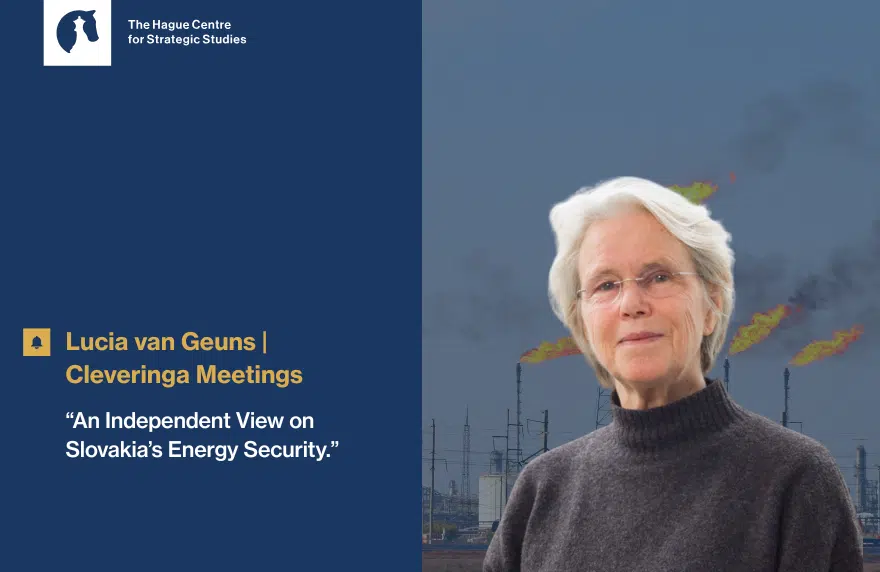The path toward a new energy system will be a messy one, requiring a joint program allowing for a more strategic, coherent, and coordinated approach from governments and the industry, says HCSS energy expert Lucia van Geuns in an interview with ORTEC, about the so-called ‘energy trilemma’, which plays an important role in climate policy.
“Just like we blindly walked into Putin’s gas dependence trap, we’re doing exactly the same thing when it comes to strategic raw materials and Xi Jinping.”
Lucia van Geuns, Strategic Energy Advisor, focuses on energy security and the geopolitics of energy at independent knowledge institute The Hague Centre for Strategic Studies (HCSS). In her expert opinion, the energy market will be facing volatile and uncertain 10 to 15 years: “Developing future scenarios and storylines are crucial in strategic thinking, both for companies and countries. Though, it is important to realize that there is no predicting the future. The path toward a new energy system will be a messy one, requiring a joint program allowing for a more strategic, coherent, and coordinated approach from governments and the industry.
Geologist Lucia van Geuns is somewhat of an ‘odd one out’ at HCCS, “Combining my STEM background with politicology, defense and macro-economics gives me a great opportunity to spar with colleagues about oil and gas, tank storage and critical minerals.” Doubling down, she stresses the importance of the latter: “Just like we blindly walked into Putin’s gas dependence trap, we’re doing exactly the same thing when it comes to strategic raw materials and Xi Jinping. We have been rerouting value chains through China for years, but we will need minerals like cobalt, copper, lithium and rare-earth metals to fuel the development of sustainable technology. Without those resources, transitioning to a low-carbon economy will be a huge task indeed.”
Global energy mix
In her lectures at Dutch university TU Delft, Van Geuns primarily introduces students to the energy transitions of the past, such as the move from biomass to coal and the subsequent industrial revolution that heralded unmatched prosperity and economic growth. “We have gone through countless transitions already, most of which have revolved around technology. The world’s mix of primary energy forms has evolved into a highly diverse mix, 80% of which still consists of fossil fuels. The same was true in 1990. Coal did not make way for oil, oil was simply added to the mix.” Economic growth and demographic developments have determined the scale of our current energy consumption levels, Lucia explains:
“Consumption levels have increased tenfold since the beginning of the last century. We are consuming vast amounts of energy, the scale – depending on where you live – will determine the speed of the energy transition. China’s energy mix is dominated by coal, while sub-Saharan Africa depends mainly on traditional biomass. We will all have to go through the low-carbon transition, which will be dictated largely by policy and climate change concerns. Solar and wind will undoubtedly be a big part of the global energy mix 2050, but how big? Will the share of fossil fuels be cut to 20% by 2050, or will it stay at 60%? In order to reach a net-zero economy in 2050 and cap global warming at 1.5° by 2100, you have to look at back-casting scenarios, working backwards from 2050 to find an approach that will get us where we need to be. The Net-Zero by 2050 scenario published by the International Energy Agency in May ‘21 shows clearly that we are way off target. Even the IPCC has admitted that we stand no chance of curbing global warming at 1.5°C. It’s a painful realization.” And yet there is hope, Van Geuns argues. “The growing awareness of the need of a speedy, policy-driven transition in the past decade has been essential. Transitions have always taken a very long time. The US is on track for 2050 and Europe has followed suit with the Green Deal. It will take China and India a little longer to reach net zero, but they will get there in the end.”
“We are consuming vast amounts of energy, the scale will determine the speed of the energy transition.”
Ukraine not a game changer
The so-called “energy trilemma”, the balance between security, affordability and sustainability, plays an important role in climate policy. Van Geuns: “In the US, energy security has always been paramount. It is a very self-sufficient country and because the US is one of the world’s main exporters of gas, it has more control over a sufficient supply of affordable energy. The Biden administration delivered a big infrastructure boost and a billion-dollar fund to encourage the US industry to produce as much renewable energy as possible. In doing so, the US has firmly committed itself to a clear course of action, and while Europe wants to do the same with the Green Deal and industrial policies, Europe is anything but self-sufficient. China, on the other hand, is largely self-sufficient, having invested heavily in nuclear energy and hydropower in addition to coal and leading the pack in solar and wind energy. At the same time, it has entered into bilateral relations with its Belt and Road Initiative. China has made great strides on critical minerals in the past 15 years, while Europe’s recent EU Critical Raw Materials Act marked one of its first tentative steps to safeguard the future supply of these essential resources. The plan is to open more mines in the EU itself and ratchet up EU production, as well as establishing strategic bilateral relations with “friendly” countries if the first two options prove impossible, such as for gas. Admittedly, however, Europe is late to the party.” Things have changed since the war in Ukraine, Van Geuns notes: “It has become abundantly clear that security of supply is an important component of sustainability policies. On top of that, we have had a major wake-up call with regard to the affordability of energy, with everyone suddenly worrying about their gas bills. From a global energy standpoint, however, I do not think that Ukraine will be a game changer. Global gas consumption will continue to grow until at least the early 2030s.”
From molecules to data
“Pushing more aggressively won’t work: the biggest strides can be made by reducing demand, which will ultimately drive supply.”
Van Geuns is a proponent of the Green Deal, but doubts that there is room for much improvement in Europe. “Pushing more aggressively won’t work: the biggest strides can be made by reducing demand, which will ultimately drive supply. The situation is complicated by the absence of a large-scale substitute for oil. In the end, the new sustainable economy will be IT-driven, she concludes. “You need IT to manage all those North Sea wind farms. All the infrastructure has been computerized and is controlled with the help of data and mathematics.
At HCSS, we are researching the cyber security aspects of sustainable energy and have concluded that security by design is a must for wind farms, especially because China is such a big supplier of offshore software and hardware. We are moving from a molecular world of oil, gas and coal to an electrified/IT-driven energy system. It is not that one will replace the other. Instead, we are transitioning from an entirely fossil-dominated system to a new system that we have only just started building. The latter requires heavy investments, but we need to keep our old system running as well. We might be remodeling our home, but we have to keep the store open as well. The latter tends to fall by the wayside, but it’s just as important.”
This interview with Lucia van Geuns was originally published by ORTEC on May 23, 2023.







